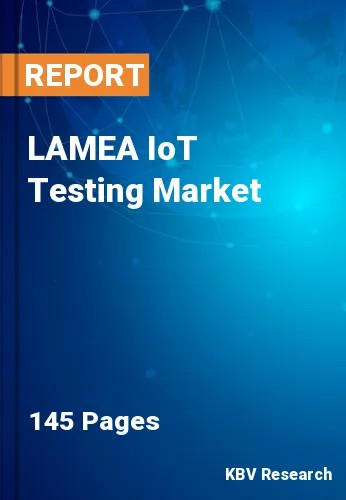The Latin America, Middle East and Africa IoT Testing Market would witness market growth of 33.8% CAGR during the forecast period (2023-2030).
The investment in IoT-enabled infrastructure will likely increase the need for security testing services for those assets, which could then fuel demand for managed services in these industries. As a result, the market is constantly changing, with new trends appearing as technology progresses. Microservices offer a framework for creating enterprise applications, especially IoT, boost application productivity astoundingly, and aid in speedy application delivery, increasing the applications' flexibility, availability, dependability, and scalability.
Additionally, it accelerates market time and shortens the SDLC for IoT applications. Additionally, the requirement for agility, the need to recompose programs to enable experimentation, and the need to support new delivery platforms like the web, native apps, mobile web, and others are the main drivers of microservices. Moreover, there is a growing need for specialized testing services due to the increasing popularity of microservices architecture in IoT applications. Due to the complexity of microservices-driven IoT systems, thorough testing is required to guarantee seamless interactions, security, scalability, and overall operation. As a result, these factors are propelling the market's expansion.
The overall number of connected devices in Brazil might reach 27.1 billion by 2025, according to a study conducted by the Brazilian Association of Internet of Things (ABINC) in collaboration with ISG Provider Lens. The report finds that since the publication of the Brazilian National IoT Plan, the market for advisory, installation, and managed services for the IoT has considerably matured. In Africa, South Africa is at the forefront of smart city technologies. Cities in South Africa are aware of the numerous advantages of smart cities, which affect various industries and simplify life for citizens in various ways. As a result of this, the deployment of IoT devices in South Africa would also surge. This increasing adoption of IoT in the LAMEA region is estimated to offer growth prospects for the market.
The Brazil market dominated the LAMEA IoT Testing Market, By Country in 2022, and would continue to be a dominant market till 2030; thereby, achieving a market value of $269 million by 2030. The Argentina market is estimated to witness a CAGR of 34.5% during (2023 - 2030). Additionally, The UAE market would showcase a CAGR of 33.4% during (2023 - 2030).
Based on Service Type, the market is segmented into Professional Service, and Managed Service. Based on Testing Type, the market is segmented into Functional Testing, Performance Testing, Compatibility Testing, Security Testing, Usability Testing, and Network Testing. Based on Application, the market is segmented into Smart Manufacturing, Smart Building & Home Automation, Smart Utilities, Vehicle Telematics, Smart Healthcare, Capillary Network Management, and Others. Based on countries, the market is segmented into Brazil, Argentina, UAE, Saudi Arabia, South Africa, Nigeria, and Rest of LAMEA.
Free Valuable Insights: The Worldwide IoT Testing Market is Projected to reach USD 15.5 Billion by 2030, at a CAGR of 31.3%
The market research report covers the analysis of key stake holders of the market. Key companies profiled in the report include Capgemini SE, Infosys Limited, Happiest Minds Technologies Limited, HCL Technologies Ltd. (HCL Enterprises), Keysight Technologies, Inc., Rapid7, Inc., AFour Technologies, Apica AB, Novacoast, Inc., and Praetorian Security, Inc.
By Service Type
By Testing Type
By Application
By Country
Our team of dedicated experts can provide you with attractive expansion opportunities for your business.

